Usain Bolt – Career In Numbers: A Tribute To The Fastest Man Ever
Usain Bolt is widely acknowledged as the greatest sprinter of all time, and for good reason too.
At PledgeSports, we are huge fans of Bolt and all that he has done to bring athletics back into the limelight with his insane talent and famous charisma.
As the Jamaican prepares to retire after the World Championships in London, we take a look at the incredible numbers and statistics behind an historical career, while also showing why he deserves to be called a legend, and how he achieved it.
Fastest Man Ever
 Usain Bolt beat compatriot Asafa Powell’s record of 9.74 seconds by clocking 9.72 in May 2008, then lowered it to 9.69 at the Beijing Olympics later that year.
Usain Bolt beat compatriot Asafa Powell’s record of 9.74 seconds by clocking 9.72 in May 2008, then lowered it to 9.69 at the Beijing Olympics later that year.
At the 2009 World Championships in Berlin, he shaved more than a tenth of a second off his record, clocking 9.58 seconds.
Back in 1912, American Donald Lippincott ran 10.6 seconds in Stockholm to set the first time recognised by the sport’s newly founded governing body, the IAAF.
Want to eat like one of the world’s best athletes? Check out 9 different diets here
Jim Hines, in 1968, was the first man to officially dip under 10 seconds, but it took almost a century for Lippincott’s time to be bettered by a whole second – courtesy of Usain Bolt.
Golden Boy
 Usain Bolt’s record medal is unprecedented and perhaps will never be repeated again. In essence, he has been an unstoppable force since claiming his first ever Olympic gold medal in Beijing nine years ago.
Usain Bolt’s record medal is unprecedented and perhaps will never be repeated again. In essence, he has been an unstoppable force since claiming his first ever Olympic gold medal in Beijing nine years ago.
Since then, Bolt has won an incredible 19 Olympic and World Championships gold medals from the 21 events he has contested.
Among those medals, the triple-triple of Olympic gold (gold in 100m, 200m and 400m relay at each of 2008, 2012, and 2016 Olympic Games). Bolt would be stripped of his relay gold from Beijing 2008 after his teammate Nesta Carter was proven to have been taking performance enhancing drugs.
Nonetheless, Bolt’s medal-winning streak shows the near-invincible nature of the Jamaican’s career.
Sub-10 Second Hero
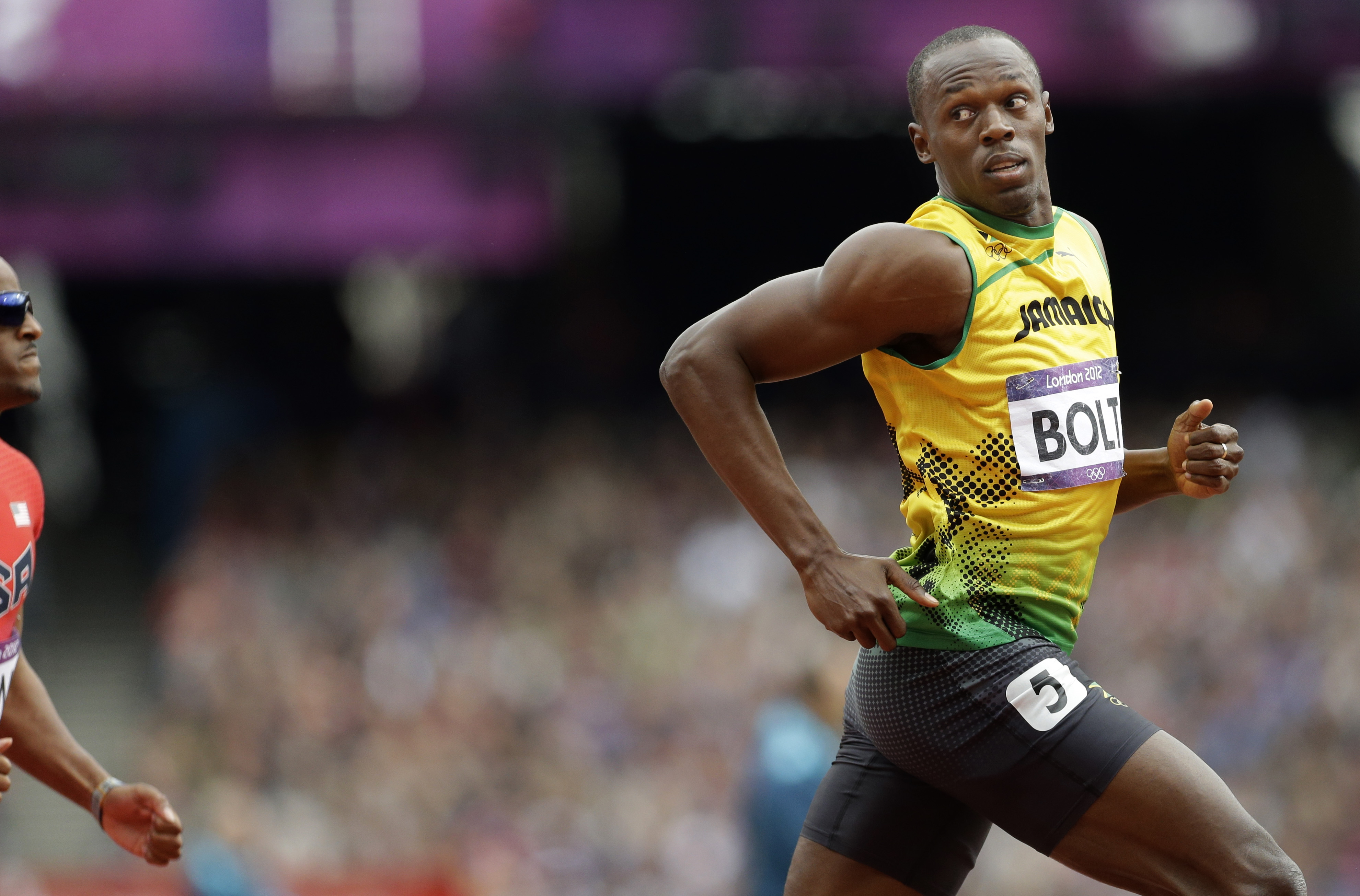 The IAAF’s pre-London list of all 100m runs under 10 seconds shows just a handful of rivals come close to Bolt’s times.
The IAAF’s pre-London list of all 100m runs under 10 seconds shows just a handful of rivals come close to Bolt’s times.
Since Hines, another 124 men have beaten the 10-second mark.
But no-one except Bolt, fellow Jamaicans Yohan Blake and Asafa Powell, and Americans Justin Gatlin and Tyson Gay (highlighted on the chart) have run under 9.78 seconds.
Bolt himself has managed that an astounding nine times in total – more than anyone else.
Master Of All Trades
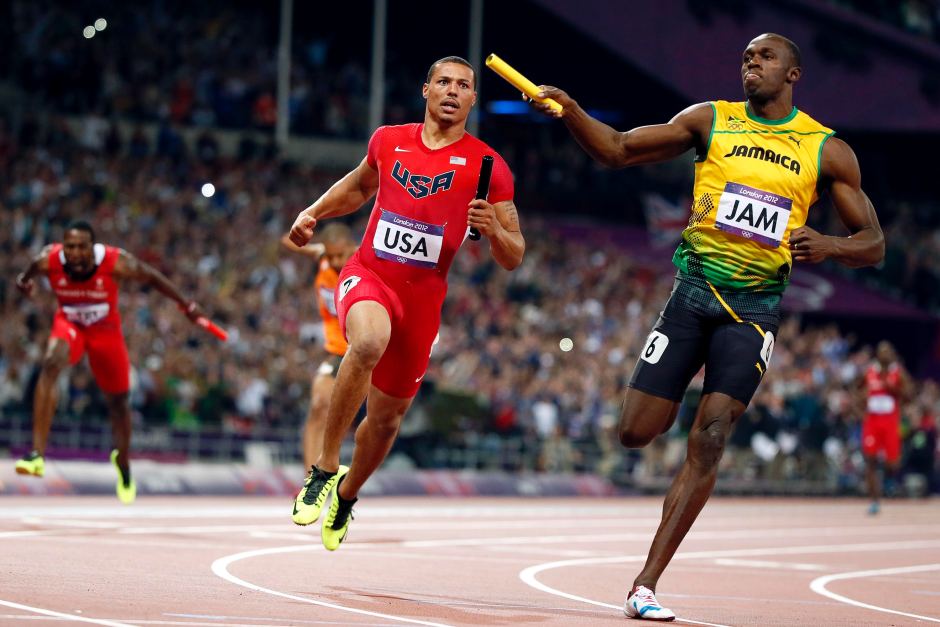 Bolt excels in the 200m and is the only man to hold world records in both distances since the IAAF began utilising automatic timekeeping in 1977.
Bolt excels in the 200m and is the only man to hold world records in both distances since the IAAF began utilising automatic timekeeping in 1977.
At the 2008 Beijing Olympics, Bolt broke US sprinter Michael Johnson’s 12-year-old 200m record of 19.32 seconds with a run of 19.30, before lowering it to 19.19 a year later in Berlin.
Consistency Is Key
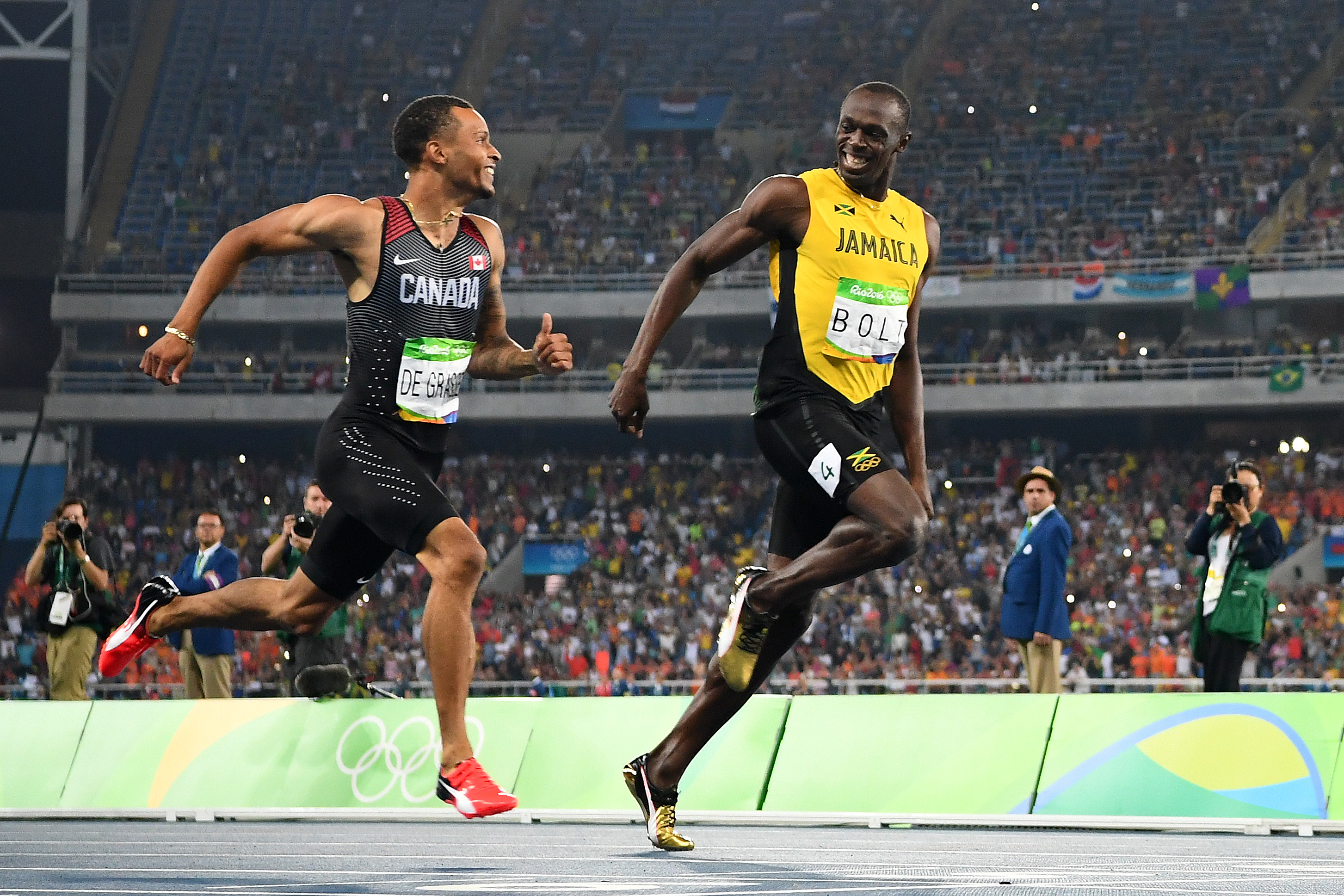 London 2017 aside, Bolt has won virtually every Olympic and World Championship race he has entered from 2008 onwards.
London 2017 aside, Bolt has won virtually every Olympic and World Championship race he has entered from 2008 onwards.
Rio 2016 saw him complete an unprecedented “triple triple” of consecutive Olympic gold medals in 100m, 200m and 4x100m relay – making him “immortal”, in his own words.
Bolt has since lost the 2008 relay medal after teammate Nesta Carter failed a retrospective drugs test – affecting the whole relay team. Carter has lodged an appeal with the Court of Arbitration for Sport.
Age is just a number – these athletes are all over 35 and still dominating their sport
Bolt’s World Championships career is blotted only by a bronze medal in London in 2017, and a false start in the 100m in Daegu, South Korea, in 2011 which meant an automatic disqualification.
Blink And You’ll Miss Him
 Bolt ran the fastest 10m of his 100m world record in a mere 0.81 seconds. That equates to 27.66 mph (44.51 km/h) – about the same speed as a galloping horse.
Bolt ran the fastest 10m of his 100m world record in a mere 0.81 seconds. That equates to 27.66 mph (44.51 km/h) – about the same speed as a galloping horse.
But the Jamaican has covered 100m quicker than 9.58 seconds when given a rolling start. He ran the second half of his 19.19 200m in in 9.26 seconds and has clocked well under nine seconds several times in the 4x100m relay, with the fastest a blistering 8.65 in 2015.
That said, age and injury have taken their inevitable toll on Bolt, who is now almost 31. His season’s bests have slowed and he has raced less often. In 2016 he ran 9.81 for 100m and 19.78 for 200m – slow by his standards, but winning times nonetheless.
A Perfect Science
 There is no simple answer but a study by Mackala Krzysztof and Antti Mero, published in the Journal of Human Kinetics, found his 6ft 5in (195cm) frame is one factor that gives him an advantage over other competitors.
There is no simple answer but a study by Mackala Krzysztof and Antti Mero, published in the Journal of Human Kinetics, found his 6ft 5in (195cm) frame is one factor that gives him an advantage over other competitors.
Being tall is often regarded as a disadvantage for sprinters at the start of a race as it can limit the drive phase when runners push forwards at an angle to gain acceleration.
But, the researchers say, by midway “Bolt’s body height resulting in long strides makes it possible for him to maintain a high speed for a longer time and decelerate at a slower rate than shorter sprinters”.
Taking It In His Stride
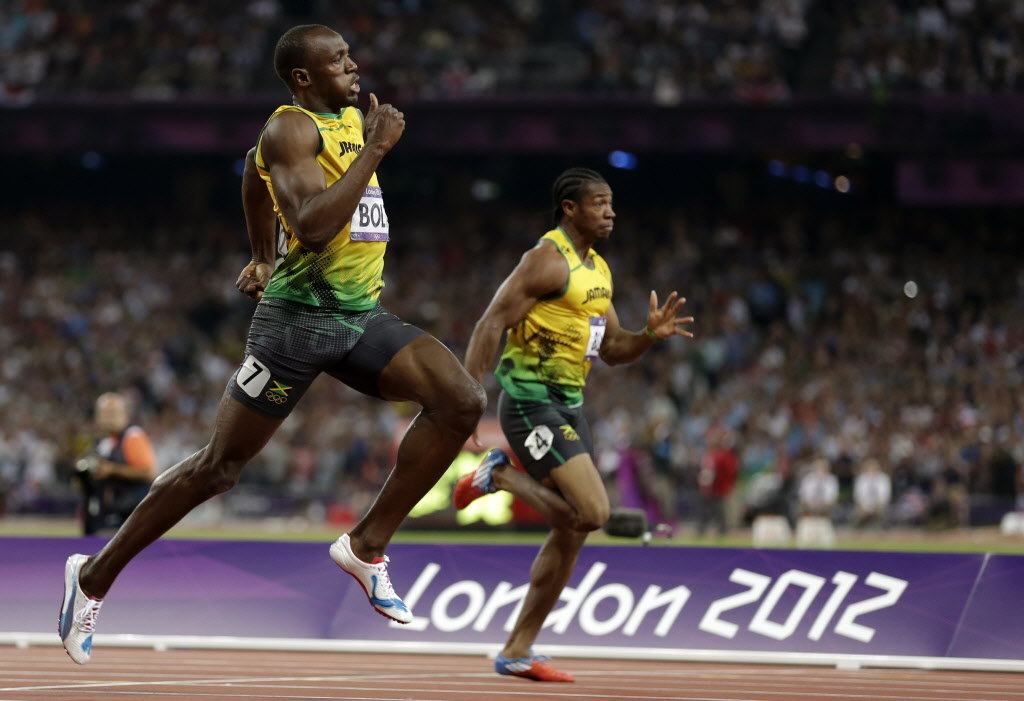 Usain Bolt has a stride length that can average 2.47m. That’s a full 20cm longer than that of most other competitors – but he also maintains a high stride frequency.
Usain Bolt has a stride length that can average 2.47m. That’s a full 20cm longer than that of most other competitors – but he also maintains a high stride frequency.
It’s a devastating combination for his rivals, as once Bolt is in full flight, he can gain ground with every step.
The Jamaican covered his world record 100m in less than 41 strides, whereas the other finalists averaged almost 45, Krzysztof and Mero found.
Slow Out Of The Blocks
 True, he is slower out of the blocks than other competitors: if you look at all his reaction times out of the blocks across his Olympic and World Championship 100m races (except for his false start at Daegu 2011), pre-London he averaged 0.158 seconds while the other finalists averaged 0.149 seconds.
True, he is slower out of the blocks than other competitors: if you look at all his reaction times out of the blocks across his Olympic and World Championship 100m races (except for his false start at Daegu 2011), pre-London he averaged 0.158 seconds while the other finalists averaged 0.149 seconds.
But, according to Michael Johnson, in his best races Bolt manages to achieve a similar drive phase as less tall runners. “You will see that in the first 30m or so he’s right there with the shorter sprinters, which is rare,” Johnson told the Olympic Channel.
We answer the near-impossible question: “What is the fittest sport?”
In his world record race, Bolt was the quickest throughout. He was already ahead by 20m and fastest over every subsequent 20m section.
At London 2017, though, his reaction time of 0.183 was slow for him – and 0.031 slower than anyone else in the race.
The Man, The Myth, The Legend
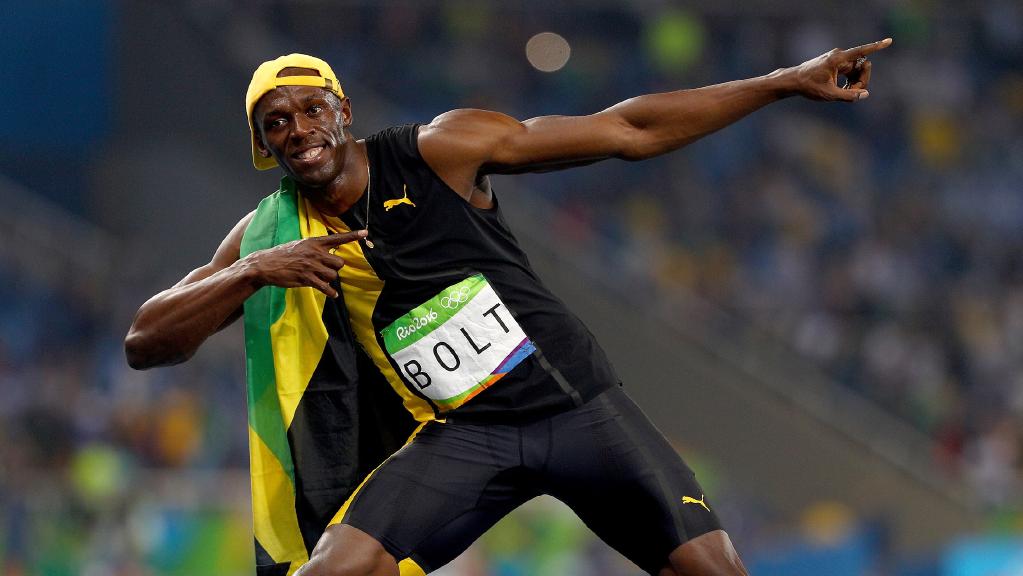 With Bolt, there is always more besides the running. From his ‘Lightning Bolt’ pose and goofing around on the track, to his claim he ate “about 1,000” chicken nuggets at the Beijing Olympics, Bolt’s playful personality has brought superstar status.
With Bolt, there is always more besides the running. From his ‘Lightning Bolt’ pose and goofing around on the track, to his claim he ate “about 1,000” chicken nuggets at the Beijing Olympics, Bolt’s playful personality has brought superstar status.
Occasional criticism for “showboating” before crossing the line has done little to dent his reputation with fans.
These are the 10 best athletes in the world
On the eve of his retirement, he is one of the world’s most popular track athletes on social media with a following of almost 19 million on Facebook, 7.1 million on Instagram and 4.75 million on Twitter.
Bolt donates to charity through his foundation, including many years’ support for his old high school in Trelawny Parish, Jamaica.
But will he now step off the world stage into the shadows? The man himself says he wants to “relax a little bit, enjoy myself as much as possible”.
And, after that, perhaps a continuing role in global athletics.
But there is no doubt that the sport will miss him. IAAF chairman Lord Coe told the BBC recently: “What we will miss is the personality. We do want athletes with personality.”
There are no numbers that can capture that.
PledgeSports is the global leader in crowdfunding & sponsorship for sport.
Are you or someone you know raising money for sport in 2017? If so, get in touch with us via [email protected], or visit www.pledgesports.org and hit “Create A Campaign” to start raising money today!
For all the latest sports news follow PledgeSports on Facebook, Twitter, and Instagram.
